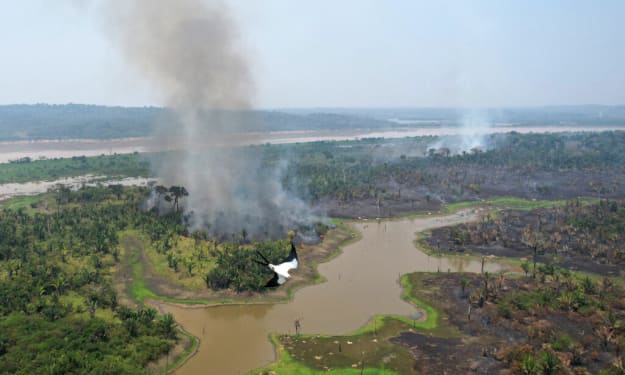Environmental Activism
Echoes of Change

In the heart of a bustling city named Rivertown, where towering skyscrapers cast shadows on bustling streets, lived a young woman named Maya. She was a dreamer with a fire in her heart—a fire ignited by a passion for the environment and a determination to be a catalyst for change.
From a young age, Maya had been captivated by the natural world—the rustling leaves, the gentle flow of rivers, and the symphony of birdsong. But as she grew older, the city's relentless development threatened to suffocate the beauty she held dear. Maya couldn't ignore the signs of environmental degradation—the smog-choked skies, the shrinking green spaces, and the rivers that had become polluted arteries.
One day, while walking along the banks of the polluted river that ran through Rivertown, Maya felt a surge of frustration and sorrow. The river, once a lifeline, had become a symbol of neglect and indifference. As she watched plastic bottles drift downstream, her resolve solidified—she couldn't stand idly by any longer.
With a fierce determination burning in her chest, Maya turned to activism. She began by organizing local clean-up events, rallying friends and strangers alike to join her in restoring the river's health. But as she stood knee-deep in the muck, pulling out garbage, she realized that the problem ran deeper than surface-level litter. The city's policies and practices needed to change, and that required a louder voice.
Maya's activism evolved. She joined environmental organizations, attended town hall meetings, and spoke passionately about the urgent need for change. She became a familiar face at city council sessions, advocating for sustainable development and urging the community to prioritize the environment over profit.
But as Maya's efforts grew, so did the opposition. Powerful interests fought against change, their pockets lined with money from industries that profited from the status quo. Maya faced ridicule and criticism, but she refused to be silenced. She saw the faces of the people who believed in her cause—the children who deserved clean air and open spaces, the elderly who longed for the serenity of nature, and the creatures whose habitats were disappearing.
One evening, as Maya stood before the city council, her voice steady despite the nerves that fluttered in her chest, she spoke not just for herself, but for every person who longed for a healthier, more sustainable world.
"Our city's progress shouldn't come at the cost of our environment," Maya declared, her eyes locking with those of the council members. "We have a responsibility to the generations that will inherit this city after us. We have a duty to protect the air they breathe, the water they drink, and the green spaces that offer solace and respite."
Her words resonated in the room, hanging in the air like a plea for change. The council members exchanged glances, and for a moment, Maya felt a spark of hope. And then, the room erupted into a heated debate—the clash of opposing viewpoints, the tension between economic growth and environmental preservation.
Months passed, and Maya's activism continued to gain momentum. She organized rallies, wrote impassioned articles, and used social media to raise awareness about the urgency of the situation. Her commitment was unyielding, fueled by the knowledge that the environment's plight was a reflection of society's values.
One fateful day, as Maya stood at a protest outside the city's main square, something shifted. The atmosphere was charged with energy, a palpable sense of unity among the people who had gathered to demand change. Maya looked around at the diverse crowd—students, parents, workers, and retirees—each holding a sign that bore a message of hope and determination.
As the protest unfolded, Maya found herself standing next to a woman in her sixties, her eyes bright with determination. The woman introduced herself as Eleanor and spoke of her own days as an activist during a time of civil rights struggles. Maya listened with rapt attention as Eleanor shared stories of resilience, of fighting for justice even when the odds seemed insurmountable.
"Young lady, change takes time, but it also takes people who are willing to stand up and fight," Eleanor said, her voice steady with conviction. "You remind me of my younger self—the fire in your eyes, the unwavering belief in a better world. Keep fighting, Maya. The world needs more people like you."
Touched by Eleanor's words, Maya felt a renewed surge of determination. She realized that her activism wasn't just about the environment—it was about the legacy she would leave behind, the impact she could make on the world, and the connection she shared with generations of activists who had come before her.
Months turned into years, and Maya's efforts yielded tangible results. The city council began to shift its stance, passing measures that prioritized sustainability and environmental protection. The river that had once been choked with pollution began to show signs of life, as fish returned and the waters cleared.
One day, as Maya stood by the now-clean riverbank, her heart swelled with a mixture of pride and gratitude. Eleanor stood beside her, a smile of satisfaction on her lips.
"You did it, Maya," Eleanor said, her voice filled with admiration. "You proved that the power of one person's voice can spark a movement, inspire change, and create a better world for us all."
Tears welled in Maya's eyes as she looked around at the transformed landscape—the green spaces, the thriving river, and the city that had begun to embrace a more sustainable future. She realized that her journey was not just about environmental activism—it was about the profound connection she had forged with her community, the history she had been a part of, and the hope she had ignited in the hearts of those around her.
And as the sun set on Rivertown, casting a warm glow over the city that had undergone a transformation of both landscape and spirit, Maya knew that her journey was far from over. She would continue to stand up for the environment, to speak out against injustice, and to honor the cross-generational legacy of activism that had shaped her path. Her voice had become an echo of change, a testament to the enduring power of activism, and a reminder that the world was shaped by those who were willing to stand up and make a difference.





Comments (1)
Hello, AI is permitted on Vocal. It is a Vocal policy that content created with AI is identified as such at the start of the story/article. Your article/story has many hallmarks of AI-assisted/generated content. You can find the details of the Vocal policy here: https://vocal.media/resources/an-update-from-vocal-on-ai-generated-content, Please amend your piece to be in compliance. If you are not a Vocal+ member you will need to contact Vocal here ([email protected]) and ask them to edit your story/article/poem for you. If you don’t correct this the content may be removed by Vocal and/or you may be deleted from the platform.